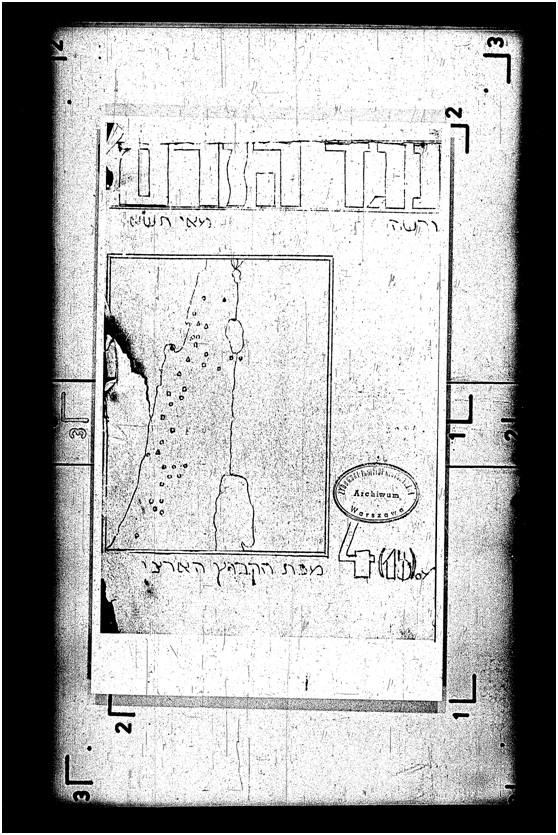
Neged Hazerem (Against the Current), Publication of Hashomer Hatzair, Polish , Issue 4, Warsaw, May 1941
In this final segment of an interview regarding the English-language version "The Jewish Underground Press in Warsaw," Academic Editor Dr. Tikva Fatal-Knaani recalls some of the challenges and unusual discoveries she encountered while working on the project.
How did the ideological and political streams that were popular in the ghetto affect their overall outlook on the plight of the Jews during the war?
The ideology and political way of thinking often led to attacks on the Jewish leadership, as well as ideological opponents: for example, for a long time the Bund ignored the special fate of the Jews under the Nazi regime because in its opinion there was no fundamental difference between the situation of the Jews and the situation of other peoples. The "enslaved," therefore, preferred the alliance of Jewish workers with Polish workers over general Jewish solidarity. The Bund in fact presented antisemitism as a class phenomenon. Hashomer Hatzair members attacked this approach, and accused them of ignoring the difficult problems of the Jewish youth masses during the occupation, and made no attempt to address the Jewish distress. Another example is that while the Zionists believed that the West, Britain and the United States would overcome Nazism and bring victory, the Socialists and Communists in their various shades saw Soviet Russia as the key to eradicating fascism, and the domination of socialism in the world. Hence the debate over the future of the Jews after the war: the Land of Israel according to Western democracies, or the integration of the Jews into a universal socialist society.
What surprised you most about this project?
This whole phenomenon of the Jewish underground press in the Warsaw ghetto is amazing. I have been reading it for decades, and every time I am surprised by the great diversity of content. Even in the depths of despair in the ghettos, Jews were compelled to write and publicize wider worldviews, and fight to maintain their Jewish and cultural values. The writers referred to the course of the war in the world, but also talked about what was happening in the Land of Israel. The editors gave great importance to their cultural background; Hebrew literature and Jewish education was a constant in most, if not all, of the newspapers. Despite or perhaps in spite of the chaos in the ghettos and the uncertainty of physical existence, they clung on to these ideas with desperation and conviction.
Along with the figures on mortality and hunger, the situation at the front, speeches by heads of state and the world after the war, the writers did not abandon the concern for libraries, and did not forget to mention the days of remembrance of special figures in Jewish culture like Herzl and Bialik, Mendele and Peretz Joseph, Herman Lieberman and Norbert Berlitzky.
In this press, there are also references to the value of struggle in ghetto life, such as how to preserve moral values in this unfamiliar and extreme reality, and how not to forget the weak and how to support them. There was a struggle for the preservation of values and social frameworks that the Nazis tried to eliminate. This press thus reflects the spiritual empowerment not only of the activists of the parties and youth movements, but also of the residents of the ghetto who raised the miracle of the revolt against the Germans. Despite the real dangers of publishing this press, its activists continued to publish and distribute it even after the ghetto was liquidated in 1943.
What can we learn from the underground press about the Jews who lived in the ghetto?
One of the motifs expressed in the Jewish Underground Press was the belief that despite their victories, the Germans would end up losing the war. In January 1941, Biuletyn announced, "The world will defeat Hitler; the world of democracy, the world of liberty, the world of socialism, will defeat the regime of dictatorship and enslavement." This expression affected many Jews in the ghetto. The press believed in the youth and encouraged their spirit, and fought ignorance through literary, historical and scientific reviews that enriched the readers' spirit in the belief that the war would end and some "education" would be needed.
The patient and long-term vision of the times after the war is an important dimension in Jewish history that culminated in those fateful years of World War II. Although it was expressed by activists of the movements and parties, they represented a very wide audience. Of course, there were also those who raised their hands and looked only at the present that promised nothing but hardship, scarcity, disease and death. The press called on the Jews to shake off the indifference and not accept that verdict. Instead, they should join hands and fight together. Der Ruf (The Appeal) on behalf of Poalei Zion (Left) announced in May 1942 "that the hour now demands the unification of all forces in the struggle with the conqueror, and that the order of the hour is to establish a national liberation front by forming and uniting all the active forces of the people to deal with the enemy." In this way, the underground press prepared the Jews for the coming days of the Aktion and thus played an important role in preparing the ground for armed resistance both in January and April 1943.
The difficulties and dangers in publishing and distributing these newspapers were very real. Precautionary measures were a must, such as the last reader destroying the issue. Despite all this danger, however, there was no limit to the desire and deep belief in the righteousness of their path, their long-term vision, and their courage to take the reins of life.











